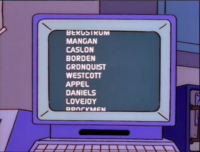Dream Space: an introduction to online obsessions for National Poetry Month
By Emma Healey
I’m writing this post in the middle of a sick day, in the middle of a sick week. I’ve been couchbound for what feels like a decade – my brain is foggy, my voice is shredded, and I’ve watched so much TV I can feel my brain evaporating in my skull. I cannot remember what fresh air tastes like. A two-line email takes me hours to write, and when I try to read a book, my focus slides off the pages like they’re coated in Teflon. I’m desperate for some personalized distraction – something weird and specific and entertaining and endless, something I can dissolve my attention inside until I forget I have a body at all. I pick up my phone, open Safari, and type in the same thing I always do.
Let’s pause here for a second. I’ve always been a firm believer that you can learn a lot about a person by looking closely at their online obsessions: the hidden corners and rabbit holes of the internet they choose to visit when they’ve got real time to kill. I don’t mean social media, and I’m not talking (necessarily) about porn – I mean deeply recreational internet use, the rabbit holes you compulsively click your way down into when there’s a whole blank night stretching out before you.
Learning about a person’s online obsessions is like hearing about their dreams, except way better – because it’s always actually interesting, and because you can actually explore what they're talking about themselves, from the comfort of your own home. While the internet might once have felt like a tool, for most of us it’s now something way more intimate – a wearable outpost of consciousness, a simultaneously real and imaginary space where you bring your private fears and desires to be melted down into an infinitely refracting collective id. (If this sounds a little overblown to you, just take a look at all the questions you’ve googled on your phone in the past few weeks, or all the tabs you currently have open in its browser; chances are you’ll see a fingerprint of your own mind, the physical evidence of a train of thought that would otherwise have passed through you invisibly).
Online rabbit holes, like dreams and poems, contain their own symbolic order and unique vocabularies. You learn their rules by spending time inside them, and you learn something new about people too, each time you fall down into one. There is often a balance of deep significance and absurd comedy to be found in these spaces; a lot of the time there’s real sadness and longing too. A brief list of things I’ve become obsessed with on the internet in the past few years: cable access TV clips, all kinds of infomercials, people vacuuming their pets, everything here, thematically grouped Simpsons clips and stills, chess champions and chess hustlers, Periscope. There’s more. There’s always more!
Just as looking at the specific corners of the internet can teach you things about the world of other people, looking at the things a specific person is drawn to in those corners can teach you a lot about the interior of their mind. To that end, I’m going to be trying something special in my time as Open Book’s writer in residence. All throughout April, I’ll be posting interviews with Canadian poets about their personal online obsessions – the things they compulsively click on when they're alone. We'll see what we can learn about their lives, their minds and their work by looking closely at what they do with those minds when they’re not writing. I think it’ll be fun.
Your CanLit News
Subscribe to Open Book’s newsletter to get local book events, literary content, writing tips, and more in your inbox
The views expressed in the Writer-in-Residence blogs are those held by the authors and do not necessarily reflect the views of Open Book.
Emma Healey’s first book of poems, Begin with the End in Mind, was published by ARP Books in 2012. Her poems and essays have been featured in places like the Los Angeles Review of Books, the FADER, the Hairpin, Real Life, the National Post, the Globe and Mail, the Toronto Star, the Walrus, Toronto Life, and Canadian Art. She was poetry critic at the Globe and Mail (2014–2016) and is a regular contributor to the music blog Said the Gramophone. She was the recipient of the Irving Layton Award for Creative Writing in both 2010 and 2013, a National Magazine Award nominee in 2015, and a finalist for the K.M. Hunter award in 2016.



